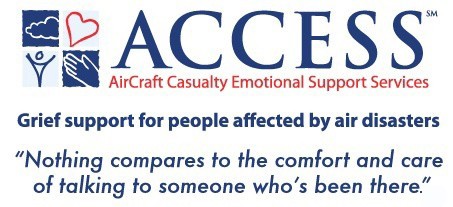“All hearts come home for Christmas,” read the verse on the front of a Christmas card that I received a few years ago. When I read it, I immediately thought about all of the people whose loved-ones had died during the preceding year. I wondered if broken hearts would be as welcomed in homes over the holidays as the cheerful ones.
Over the years through interviews with family members of people killed in air disasters, and from my own experience, I have come to understand how difficult the holidays can be for those who are grieving. It seems that there is a tendency on the part of well-meaning family members and friends to invite survivors to parties and celebrations in an effort to improve their mood. I find that for many survivors, several holiday periods must be endured before new traditions replace old ones, and before painful reminders of our deceased loved-ones are replaced with joyful memories.
Repeatedly, I hear survivors describe the pain they feel when friends and other family members let them know that the time has come for their grief to end. “When are you going to get on with your life?” and “Is this what you think your deceased loved-one would want you to do?” are two of the many questions that usually lead into these discussions. Sadly, this may happen after only a few weeks or months post-crash.
I wish that more people understood newer theories on healthy grief that support our need to include deceased loved-ones in our lives forever. Learning about how others honor and celebrate the life of a loved-one, particularly during the holiday season has been an interesting and encouraging part of my work. It is my hope that as readers you will feel a sense of connection with many survivors who have endured the impatience of others who simply do not understand the pain of bearing a broken heart in the midst of the holiday season. These are suggestions that I have gathered from other survivors for coping with the holidays.
First, be honest. Honesty can greatly reduce stress, freeing needed energy for the grief work that must be done. Having to pretend that things are the same, when they never will be again, takes a great deal of energy. Most survivors don’t have any energy to spare. When asked to take part in a holiday party or celebration, be honest about whether you have the energy to go or not. Accept invitations where you know you can be yourself and express your true feelings.
I know that this poses problems for families who have children at home who are focused on their own needs for the normal merriment of the holiday season. Most experts agree that honesty works best here too. Do the best that you can to fulfill the needs of younger children. With older children and other family members explain your need to celebrate the holidays with more reserve. Some survivors find that it helps to encourage those who can enjoy being with others to attend parties and other social gatherings. If you do find yourself alone, remember that this time can be used to more fully concentrate on the spiritual meaning of the holidays. Dr. Alan Wolfelt, a well- known thanatologist, teaches us that the grief experience is largely a spiritual one. What better time to focus on the spiritual connection that we have with our deceased loved-ones than during the holiday season.
Secondly, choose to be around people who understand your need to talk about the deceased. Should you wish to tell a story about your sibling, child, significant other, or anyone no longer physically present, you need to know that others will share your joy over those memories.
Similarly, if you suddenly experience tears over a reminder that he or she will not be with you for the holidays, you need to know that this painful expression is also acceptable. It is important for you to be in the presence of others who know that this fluctuation of feelings is normal and appropriate. Accepting your full range of emotions is a necessary part of the integration of a major loss in your life.
Third, be willing to establish new traditions if some holiday rituals become too painful to continue in the absence of your loved-one. A woman whose husband was killed in an air disaster in early 1999 told me that she and her sons were exploring new holiday traditions. Cutting their own Christmas tree had become an annual family event shortly after the birth of their first son. She and the boys decided that this particular ritual would be too sad to continue without their dad. They were considering various ways that they now might obtain their tree. The family planned to evaluate other traditions. Some they would maintain, while others would be replaced, as they sought to honor special memories of their dad while adjusting to a future without his physical presence.
Fourth, if you have not already done so, consider establishing an annual holiday gift-giving ritual in memory of your loved-one. Finding a way for including a deceased child or anyone whose absence is felt keenly by a family is especially important. Survivors have told me about buying and wrapping gifts for needy children or a charity and giving the gifts in memory of the deceased. One family decided to buy gifts for children in an orphanage and placed them under the tree with all of the other gifts. The day before Christmas, the family enjoyed delivering the gifts. This became an annual event. The following year, extended family members joined them in the gift giving. The parents never again feared pressure from others to leave out their deceased child during Christmas.
Another survivor’s husband died a couple of months before the holidays in an air disaster. She knew how much he enjoyed contributing money to a boys’ home in a near-by town. Determined to honor him in the best way possible, the first holiday after he was killed, she challenged the employees where he worked to match her contribution to the holiday celebration for the orphaned boys. They eagerly matched her contribution and together they shared in the joy of giving in the memory of a man they all respected. In the name of her beloved husband, and in the midst of great pain, she and his friends brought joy to the lives of children without families.
Finally, be patient with yourself and others. The connection that you have with anyone you truly love never goes away. Steven Levine, therapist and author of many books about death and the grief experience of those left behind, believes that after death, the spiritual connection between the deceased and those who mourn them becomes stronger. Therefore we are inseparable from those we love. Findings in the earliest research on loss, as well as newer studies, consistently indicate that healthy grief involves acknowledging our feelings and experiencing our grief fully. There are no short cuts for healing soul wounds. We know now that the goal of mourning is not to forget, but to remember in ways that honor our deceased and our relationship with them. Although the relationship changes with those no longer present, the love never goes away. Tears of sorrow and tears of joy come from the same place in the heart.
A few months ago, I saw a new greeting card with a verse by Christian Morgenstern. I purchased several copies and have sent it to several survivors after interviews. It reads “Home is not where you live, but where they understand you.” My wish for all of us this holiday season is that we are fortunate enough to find homes where all hearts are welcomed even our broken ones.
Carolyn V. Coarsey-Rader, PhD Higher Resources Inc. Douglaville, GA



